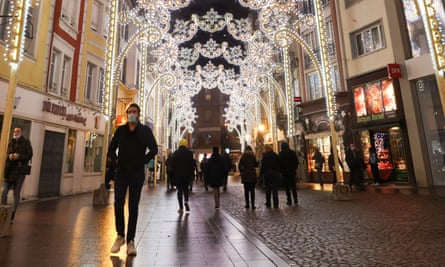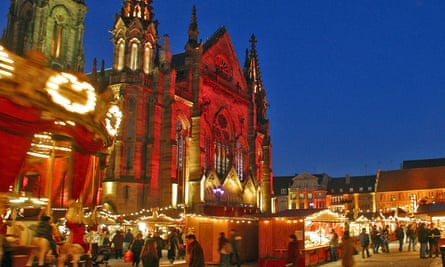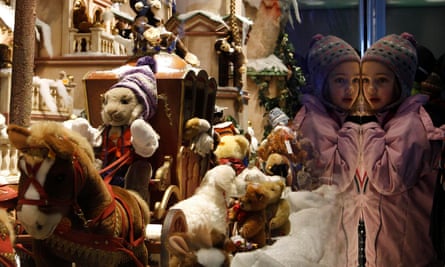European Christmas markets and illuminations are scaling back due to the energy crisis and climate breakdown – ditching seasonal ice rinks for rollerskating and switching on lights for less time.
When the traditional end-of-year markets and Christmas lights launch in France and Germany this week, in many cities such as Paris they will go dark hours earlier than usual.
But local politicians said they must still offer some kind of festive spirit to lift what they called the glum mood amid the war in Ukraine and the rising cost of living.
The western French city of Tours will replace its popular outdoor Christmas ice rink with rollerskating. Keeping the rink cold enough had cost its private operator €15,000 in electricity bills in 2020, and €7,500 last year after its size was reduced.
“It seemed a bit of an aberration to have an outdoor ice rink when the temperature here at Christmas has been 10-15C for several years,” said Martin Cohen, the deputy mayor in charge of energy and environment. “There seems no sense in keeping ice, whatever the cost, just to maintain a sense of Christmas.”

He said that with global heating, towns in France “have to accept that Christmas is no longer the image of snow, ice and big Christmas trees. We’ll maintain what we can because we need the magical, festive side of Christmas, but some elements have to evolve.”
The city always sourced its vast Christmas tree locally, but it had noted that pines were not growing as well in the area any more because of rising temperature and droughts.
Mulhouse, in eastern France, cited the French government’s directive to reduce energy consumption in order to avoid outages this winter. Its Christmas tree used to be lit up every day from 10am “to create atmosphere”. Now the tree and the city’s Christmas lights will be switched on at 5pm as a daily “event”. Reducing the number and timing of lights will use 35% less energy.
“It’s a civic duty for local authorities to guarantee a special moment at Christmas, but we’ve made adjustments,” said Philippe Trimaille, the deputy mayor in charge of commerce.

Strasbourg, known as France’s “capital of Christmas”, has the country’s biggest Christmas market, which was hit by a gun attack in 2018 and then cancelled in 2020 due to Covid. All lights are low-consumption LED, the number has been reduced this year, and the illuminations will vary so that not all lights blaze at the same time. Plastic-free, reusable cups are being tested for mulled wine.
“People do want the magic of Christmas, so we’re looking for a responsible balance,” said Guillaume Libsig, the deputy mayor in charge of city events.
after newsletter promotion
German cities such as Regensburg, Munich and Bamberg – where Christmas markets are a magnet for tourists – have shortened the daily times when they will be lit. Bremen’s Christmas light season, which usually runs from the end of October to the end of February, will run this year from 20 November to 31 January. In Düsseldorf, lights will burn for five hours a day instead of 15.
Christmas market stallholders have been encouraged to rethink lighting, with fewer illuminated icicles or chains of fairy lights and more LED lanterns.

Many German towns are avoiding ice rinks altogether: Bad Neuenahr, badly hit by flooding in the summer 2021, will have its first Christmas market since the disaster, introducing a rollerskating rink instead.
“There was a long debate in Germany whether Christmas markets should take place this year at all,” said Frank Hakelberg, of the German association of funfair workers. “In the end, we won the argument because we were able to show that the per capita use of electricity at a Christmas market is lower than if people were to stay at home. It might be a bit of a cheeky thesis, but in a way Christmas markets are energy savers.”
He said most German Christmas markets had for years been lit with LED lights, which require about 90% less electricity than conventional incandescent bulbs. Nonetheless, Hakelberg said many markets this year would switch on their lights only after nightfall, rather than when markets open in the afternoon. Some, such as the Christmas market in the central town of Fulda, will remain closed every Monday and will not open until midday, later than in previous years.









